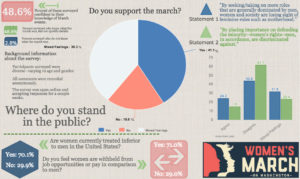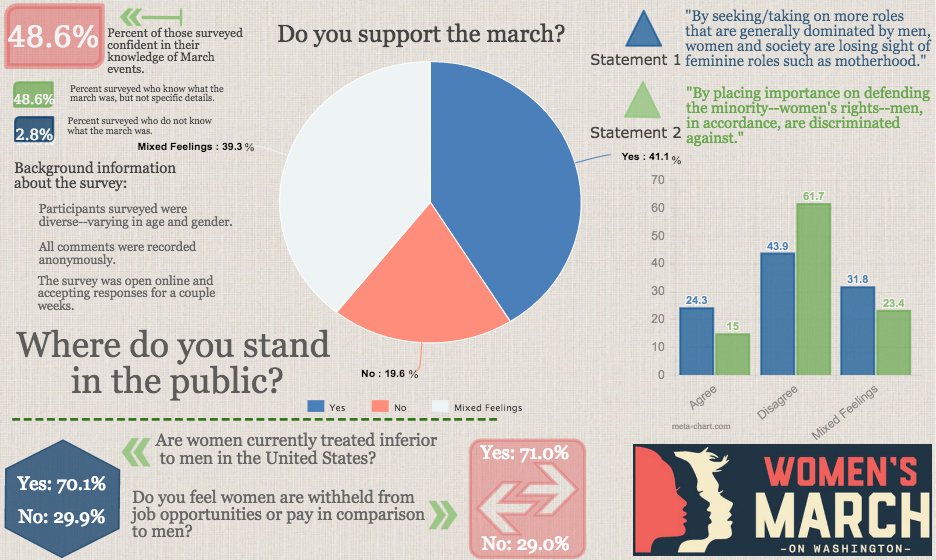January 21, 2017 was a monumental day; people throughout the world gathered together to march peacefully. The march became known as the “Women’s March”–although the title is somewhat misleading; the march was not limited to a single cause. As a result, opinions on the march have varied based on moral beliefs.
The public was given an opportunity to voice their individual perspectives anonymously via survey. The following data was recorded.

The public’s perspective on the Women’s March. Infographic by Emma Jacob via www.easel.ly.
When asked about their level of knowledge on the March, 48.6% responded they felt confident enough to discuss events in detail. An equal 48.6% knew about it, but not specific details. The remaining 2.8% claimed they did not know what it was.
The majority of participants–at 41.1%–support the March. Meanwhile, 19.6% disapprove and 39.3% replied they had mixed feelings.
Recurring comments of supporters centered on their strong belief of “human equality”. They claimed “the attitude is one of love and radical change for the better”.
Others argued it was “not a March for all women”. It would be fallacious to generalize all women support the cause; further, many felt “pro-life groups were rejected from officially participating”. This was off-setting to many since the most common repeated concern of non-supporters was indeed: “I do not support Planned Parenthood.”
Some marched in protest of President Trump’s vulgar statements on women. Others argued “women’s equality is no longer a political issue, but a cultural one”. Both responses imply that there was indeed a reason to march.
Accordingly, when asked if women are currently treated inferior to men in the United States, 70.1% responded yes and 29.9% no.
Are women withheld from job opportunities or pay in comparison to men? 71% of participants said yes while 29% said no.
The survey then inquired: Do you agree or disagree with the following statement? “By seeking/taking on more roles that are generally dominated by men, women and society are losing sight of feminine roles such as motherhood.”
The level of agreeance/disagreeance varied. Some strongly voiced their belief that “women are special in their own way! […] treating women exactly like men loses what is special about women”. One stated: “It seems ironic that women are celebrating [women seeking] validation by devaluing what has traditionally been ours.” Others claim media downplays the importance of motherhood–“seen as something women are forced into by society”–when comparing it to “glamourous” working women.
Many posed the idea of doing both: “motherhood can be done along with said ‘dominated male roles’.” They argued women can be good mothers and the primary source of income.
The opposing side petitions gender has nothing to do with parenthood or job capabilities. Placing a strong emphasis on agency: “We just want the option to choose between a life of motherhood/traditional women’s roles, and a different lifestyle if we choose”.
Participants were further questioned: Do you agree or disagree that “By placing importance on defending the minority–women’s rights–men, in accordance, are discriminated against”?
The majority disagreed at 61.7%, 23.4% claimed mixed feelings, and 15% agreed.
One mother voiced her concern: “I worry about a world where my sons […] will have to work twice as hard because of external market stimulation tipping the scale towards women”. Thus, the idea when supporting minorities–a shift of power can happen; if left unbalanced and not leveled for equality, discrimination of the opposite kind may happen. Further “there is a stereotype that every white male […] doesn’t see women as equals and […] in that aspect they are being discriminated”. Thus suggesting: falsely generalizing that all of the majority is discriminating the minority needs to be corrected–not to demise the importance of protecting those who are discriminated.
Those who disagreed believe “one group isn’t diminished just because another is elevated”. Some went as far as to use an analogy: “If a deaf child joined a class, would the hearing children feel discriminated against if the teacher were to begin signing as well as speaking?” Those who disagreed voiced that it is about “equality” and “leveling the playing field” rather than majority/minority rising above or sinking below another.
Finally, when asked to describe the purpose of the march–answers were ambiguous. Common responses include: human equality, to issue government leaders a warning of willingness to stand up for rights, and for “a sense of connection as women”. To sum up how diverse responses were: “I think if you asked 100 women why they were marching, you would get 50 different answers.”
In closing, all can agree–no matter individual moral stance: “Everyone has the right to be heard and to be empowered to make their own choices and not be treated as inferior.”
Emma Jacob
Latest posts by Emma Jacob (see all)
- The OHS Constitution — In The Words of An Administrator - April 17, 2018
- Privacy Is The Best Policy - October 9, 2017
- The Women’s March From the Public Perspective - September 5, 2017






